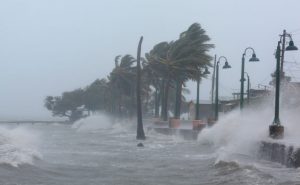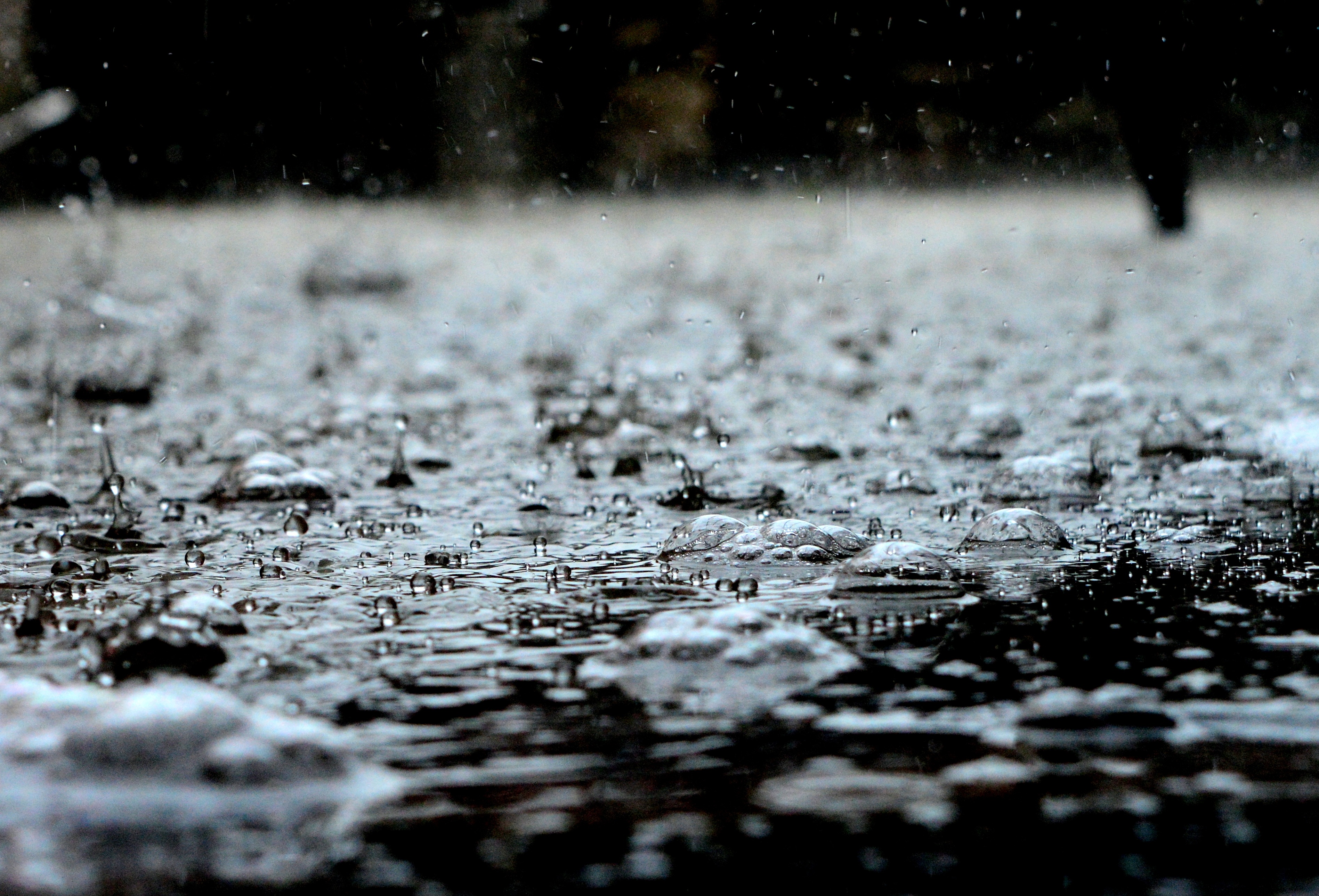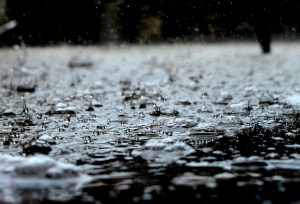Rain:
If you feel like it’s been raining forever, you’re not imagining things. It has; almost daily and at times, multiple times daily. According to several sites the Oisvorfer consulted in preparation of this week’s review, precipitation over the last 12 months (from May 2018 through April 2019) was the highest for the contiguous United States since record-keeping began in 1895. And if that weren’t enough and zicher it should be, tornadoes have been popping up every day in the U.S. as if coming off an assembly line. They’re part of an explosion of extreme weather events, including record flooding, record cold and record heat. What the hec is going on? Who and what are causing these weather extremes?
Some say that the immediate driver of the violent weather is the jet stream, the powerful winds at high altitudes that sweep west to east across North America, whatever that means. Ober so what? And who cares? Moreover, how is all this related to this week’s parsha of B’chukoisai? Nu, avada you all know that all in life can be found either in the heylige Toirah or in the heylige Gemora, including a shtikel discussion about rain. Let’s start by quoting from but one posik in this week’s parsha. Says the heylige Toirah (Vayikro 26:4), azoy: “…..“V’n’osa’ti gishmeichem b’-itom” – “I shall grant your rains at their time”. Which means what?
 Based on where this posik appears and what the RBSO tells the Yiddin this week, rain would appear to be a blessing and taka, rain in its proper time, is among the few blessings the RBSO promises the Yiddin for good behavior. Ober is rain always good? Is it always a blessing? Can it rain too much? Doesn’t wet weather force millions of Americans and others around the world, to cancel their outdoor plans? Doesn’t flooding cause major damage? It does! According to the National Oceanic and Atmospheric Administration (NOAA), the United States moved closer to being almost completely drought-free in April, with only 2% of the country experiencing drought conditions. That is zicher welcome news in California, which ended a seven-year drought only two months ago. On the other hand, the wet weather has also led to catastrophic flooding in many areas, particularly along the Missouri River. The National Weather Service reports that 44 deaths have been attributed to flooding so far this year, with 10 this month alone. Oy vey! And then there’s the Northeast, which has been so cold and wet this month that it felt more like early February than then the end of May. So, what’s the deal? Who is in charge of rain? Are we to blame Canada from whence most weather storms emanate? So say the good people at AccuWeather! Canada seems always to be the source of some pressure system that produces rain.
Based on where this posik appears and what the RBSO tells the Yiddin this week, rain would appear to be a blessing and taka, rain in its proper time, is among the few blessings the RBSO promises the Yiddin for good behavior. Ober is rain always good? Is it always a blessing? Can it rain too much? Doesn’t wet weather force millions of Americans and others around the world, to cancel their outdoor plans? Doesn’t flooding cause major damage? It does! According to the National Oceanic and Atmospheric Administration (NOAA), the United States moved closer to being almost completely drought-free in April, with only 2% of the country experiencing drought conditions. That is zicher welcome news in California, which ended a seven-year drought only two months ago. On the other hand, the wet weather has also led to catastrophic flooding in many areas, particularly along the Missouri River. The National Weather Service reports that 44 deaths have been attributed to flooding so far this year, with 10 this month alone. Oy vey! And then there’s the Northeast, which has been so cold and wet this month that it felt more like early February than then the end of May. So, what’s the deal? Who is in charge of rain? Are we to blame Canada from whence most weather storms emanate? So say the good people at AccuWeather! Canada seems always to be the source of some pressure system that produces rain.
Ober, don’t we daven for rain? Indeed we do. Each and every year on the Yom Tov of Shmini Atzeres, we do just that. Moreover, for almost half of the year, in our daily prayers –thrice daily- we include praise for the RBSO who “makes the wind blow and the rain descend,” and a request that He will “give dew and rain for a blessing on the face of the earth.” We ask Him to bring beneficial rain, which falls at the right time to nourish our crops and our reservoirs. Says the heylige Gemora (Taanis 8b), azoy: “the day when rain falls is as great as the day on which heaven and earth were created.” Is rain then both a brocho (blessing) and a klola (curse)? Let’s find out, ober a shtikel introduction first.
Way back in parshas Yisroy, the RBSO came down to Har Seenai (Mt. Siani) where following a thunder and light show, He personally delivered the Ten Commandments. This event is known as Revelation, the day the Yiddin married the RBSO. Some say it was a forced marriage; metaphorically or perhaps not, the RBSO held a mountain over the collective heads of the Yiddin and gave them an ultimatum: either we get married or we get buried under the mountain. In any event, still excited by the great miracles the Yiddin has seen and experienced, somewhat in unison, they proclaimed ‘na’a’seh v’nishma (we shall do and we shall listen). Shoin, married they were to the RBSO and married they remain over 3300 years later. Has it been smooth sailing? Not by a long shot. Why not? Ver veyst! Efsher it’s somewhat related to the fact that they jumped in without hearing the details of the marriage contract. As the parshas continued and still do, each and every week, more and more commandments were and are revealed to the Yiddin by Moishe who –following Revelation- spent 40 more days up there learning the entire heylige Toirah. This shabbis as we close out Sefer Vayikro (the book of Leviticus), as we bench rosh choidesh, and get ready for the shloishes yimay hagbolo (the three days which precede Shovuis and the great and mostly enjoyable yom tov of Shovuis (a holiday –for reasons which remain perplexing- observed mostly by the orthodox branch of Judaism), the RBSO introduces the Yiddin to Let’s Make a Deal. Centuries later, in 1963, a version of the deal was made into a television show by the same name and hosted by Monty Hall (a nice Jewish boy who when given pisicha in his shul asked if should open door #1, door #2 or door #3). Shoin, lets also give a shout- out to Carol Merril, the reason a number of you watched the show to begin with. Veyter.
 Let’s then take a quick look into the parsha. Or, maybe we shouldn’t. This week we have good and bad news to share. Let’s start with the bad: parshas B’chukoisai contains the ‘toichocho’ (admonitions, threats and curses) that the RBSO has in store for His chosen people should they disobey His heylige Toirah and go off the derech (path). As expected, the Yiddin did just that. Not once and not twice but many many times. They still do. Let’s avada recall that the Yiddin are referred to as an ‘amm kishay oiref’ (a stiff-necked people), very stubborn. Being stiff, if you chap, taka got them into a heap of trouble as we will be learning in the parshas to come. And taka the RBSO meant what He said. He has, over the generations, made good and punished His chosen people severely. Yikes! A few rabbis have written that each and every curse – all 49 delineated in this week’s parsha and the 98 we will be reading about in the summer months, has befallen the Yiddin. Don’t mess with Him! Shoin, lommer huffin (let’s taka hope) that He got them out of His system. He threatened; He delivered, and let’s hope He does not repeat. Omen!
Let’s then take a quick look into the parsha. Or, maybe we shouldn’t. This week we have good and bad news to share. Let’s start with the bad: parshas B’chukoisai contains the ‘toichocho’ (admonitions, threats and curses) that the RBSO has in store for His chosen people should they disobey His heylige Toirah and go off the derech (path). As expected, the Yiddin did just that. Not once and not twice but many many times. They still do. Let’s avada recall that the Yiddin are referred to as an ‘amm kishay oiref’ (a stiff-necked people), very stubborn. Being stiff, if you chap, taka got them into a heap of trouble as we will be learning in the parshas to come. And taka the RBSO meant what He said. He has, over the generations, made good and punished His chosen people severely. Yikes! A few rabbis have written that each and every curse – all 49 delineated in this week’s parsha and the 98 we will be reading about in the summer months, has befallen the Yiddin. Don’t mess with Him! Shoin, lommer huffin (let’s taka hope) that He got them out of His system. He threatened; He delivered, and let’s hope He does not repeat. Omen!
Ober, what’s the good news? What can possibly be good about hearing all the horrific curses the RBSO promised to punish us with for our less then admirable behavior? The good news is azoy: Parshas Ki Sovoy found in Sefer Devorim (Deuteronomy) contains twice as many admonitions, threats and curses (98 to be specific). Moreover, they are seemingly harsher than the 49 delineated this week. Shoin! More good news: As we read the last few pisukim of the parsha, CHAZAK, CHAZAK, VINISCHAZAKE (be strong, be strong and let us be strengthened), we will be bidding adieu to sefer Vayikra (the book of Leviticus) for the ninth time, and will next week begin following the Yiddin and their travails as they valgered (trekked) through the midbar (desert) for forty years due to the sins of but 10 hapless Yiddin, each a leader and an otherwise good guy. We will encounter a few very interesting characters and more, stay tuned.
Shoin, lets’ get back to rain: Can our behavior impact rain? Perhaps! Let’s now read the first few pisukim of the parsha (Vayikro 26:3-6) which tell us azoy:
| 3. If you follow My statutes and observe My commandments and perform them; | אִם-בְּחֻקֹּתַי, תֵּלֵכוּ; וְאֶת-מִצְוֺתַי תִּשְׁמְרוּ, וַעֲשִׂיתֶם אֹתָם. | |
| 4. I will give your rains in their time, the Land will yield its produce, and the tree of the field will give forth its fruit.
|
דוְנָֽתַתִּ֥י גִשְׁמֵיכֶ֖ם בְּעִתָּ֑ם וְנָֽתְנָ֤ה הָאָ֨רֶץ֙ יְבוּלָ֔הּ וְעֵ֥ץ הַשָּׂדֶ֖ה יִתֵּ֥ן פִּרְיֽוֹ: | |
| 5. Your threshing will last until the vintage, and the vintage will last until the sowing; you will eat your food to satiety, and you will live in security in your land.
|
הוְהִשִּׂ֨יג לָכֶ֥ם דַּ֨יִשׁ֙ אֶת־בָּצִ֔יר וּבָצִ֖יר יַשִּׂ֣יג אֶת־זָ֑רַע וַֽאֲכַלְתֶּ֤ם לַחְמְכֶם֙ לָשׂ֔בַע וִֽישַׁבְתֶּ֥ם לָבֶ֖טַח בְּאַרְצְכֶֽם: | |
| 6. And I will grant peace in the Land, and you will lie down with no one to frighten you; I will remove wild beasts from the Land, and no army will pass through your land; | ווְנָֽתַתִּ֤י שָׁלוֹם֙ בָּאָ֔רֶץ וּשְׁכַבְתֶּ֖ם וְאֵ֣ין מַֽחֲרִ֑יד וְהִשְׁבַּתִּ֞י חַיָּ֤ה רָעָה֙ מִן־הָאָ֔רֶץ וְחֶ֖רֶב לֹא־תַֽעֲבֹ֥ר בְּאַרְצְכֶֽם: |
Says the RBSO, azoy: If the Yiddin keep the heylige Toirah….“I will give your rains in their time, the Land will yield its produce, and the tree of the field will give forth its fruit… you will eat your food to satiety, and you will live in security in your land, and I will grant peace in the Land.” This promise of abundant rains and prosperity is followed by a warning that, should the Yiddin ignore the RBSO’s Toirah, He will “make your skies like iron”–cease all rains, and bring drought. So says the medrish. In other words: rain, the withholding or rain, and too much rain might not always be a blessing. In fact, when we daven for rain, we specifically ask the RBSO for the rain to be “for a blessing, not for a curse.” We thereby acknowledge that too much rain is just as dangerous as not enough.
 Among the brochois coming our way as a reward for being good Yiddin, is a promise of rain in its proper time. The heylige Gemora (Taanis 2a) tells us that rain is the deepest of all mysteries, (along with giving birth and the raising of the dead). Its source is above even the highest of spiritual worlds and its secret rests solely in the hands of the Creator Himself. Says Reb Yoichonon in the heylige Gemora (Tanis 2a), azoy: Three keys the Holy One blessed be He has retained in His own hands and not entrusted to the hand of any messenger, namely, the Key of Rain, the Key of Childbirth, and the Key of the Revival of the Dead.” Ober, isn’t everything in the world controlled by the RBSO? Zicher it is, ober it appears that these three keys are somewhat unique in that they remain exclusively under His domain. In other words: other matters were seemingly given over to management in the form of angels. They are charged with running the day to day activities under the RBSO’s auspices. How all that works, ver veyst? He controls rain: how much, when, where. We assume this also includes wind, humidity, storms, tornadoes and more. It’s zicher above the Oisvorfer’s pay grade to chap the management structure above and he as little interest in getting up there to find out.
Among the brochois coming our way as a reward for being good Yiddin, is a promise of rain in its proper time. The heylige Gemora (Taanis 2a) tells us that rain is the deepest of all mysteries, (along with giving birth and the raising of the dead). Its source is above even the highest of spiritual worlds and its secret rests solely in the hands of the Creator Himself. Says Reb Yoichonon in the heylige Gemora (Tanis 2a), azoy: Three keys the Holy One blessed be He has retained in His own hands and not entrusted to the hand of any messenger, namely, the Key of Rain, the Key of Childbirth, and the Key of the Revival of the Dead.” Ober, isn’t everything in the world controlled by the RBSO? Zicher it is, ober it appears that these three keys are somewhat unique in that they remain exclusively under His domain. In other words: other matters were seemingly given over to management in the form of angels. They are charged with running the day to day activities under the RBSO’s auspices. How all that works, ver veyst? He controls rain: how much, when, where. We assume this also includes wind, humidity, storms, tornadoes and more. It’s zicher above the Oisvorfer’s pay grade to chap the management structure above and he as little interest in getting up there to find out.
Says the medrish: the proper time for rain is on Friday night because that’s when people are home and don’t have to go out to work. Nu, I ask you: would you prefer rain during the week when you can get into your car and drive to shul or work, or would you prefer rain on weekends? I don’t know about the rest of my readers, but I prefer walking to and from shul on Friday nights without rain. Then again, we don’t argue with the medrish.
Says the heylige Gemora: the Toirah speaks here of rain falling “at their time,” meaning, at the time when rain is most beneficial. The simple meaning of this phrase is that the RBSO will send rain in the winter months, when it’s needed to ensure a successful crop in the spring, and not in the spring and summer, during the harvest season, when moisture would ruin the produce. Says the Chizkuni: “I shall grant your rains in their time – but when it’s not their time, they cause the grain to rot.” If rain falls on harvested grain, the grain would not last throughout the winter, and thus as much as the people needed rain in the winter to ensure the growth of quality produce, they needed rain not to fall during the spring and summer, when the produce was harvested and prepared to be stored for the winter. The bottom line: the RBSO promises that if we behave, not only will He send sufficient rainfall, but that He will do so in a manner that avoids the discomfort of being outdoors in the rain.
The bottom line: we need to stop blaming climate change on the Canadians and other factors such jet streams and pollutants: It’s the RBSO who is in sole control of weather systems and their patterns. Are we in 2019 being rewarded for good behavior with all this rain? Or, are we experiencing volatile weather and efsher too much rain for being bad? Ver veyst?!
A gittin Shabbis-
The Heylige Oisvorfer Ruv
Yitz Grossman

